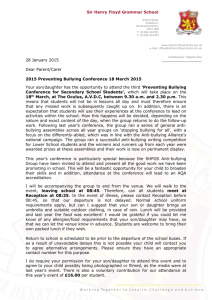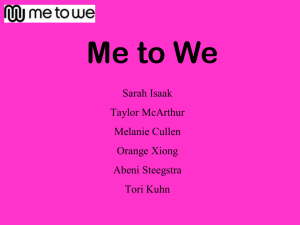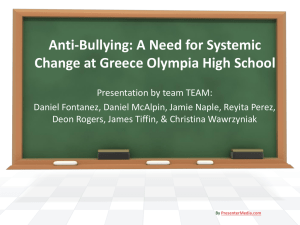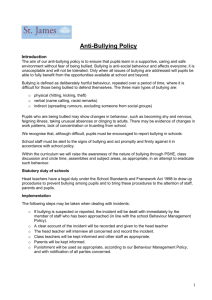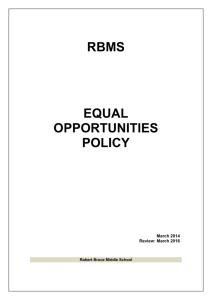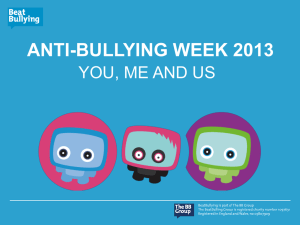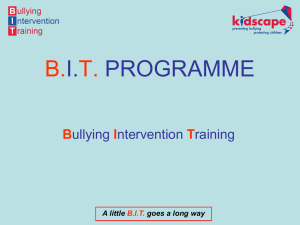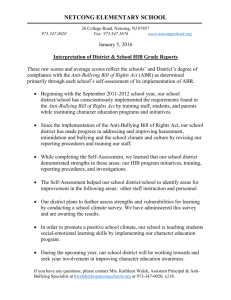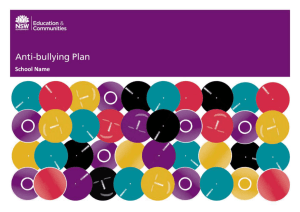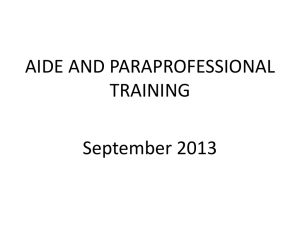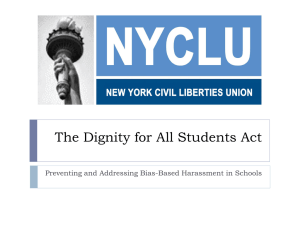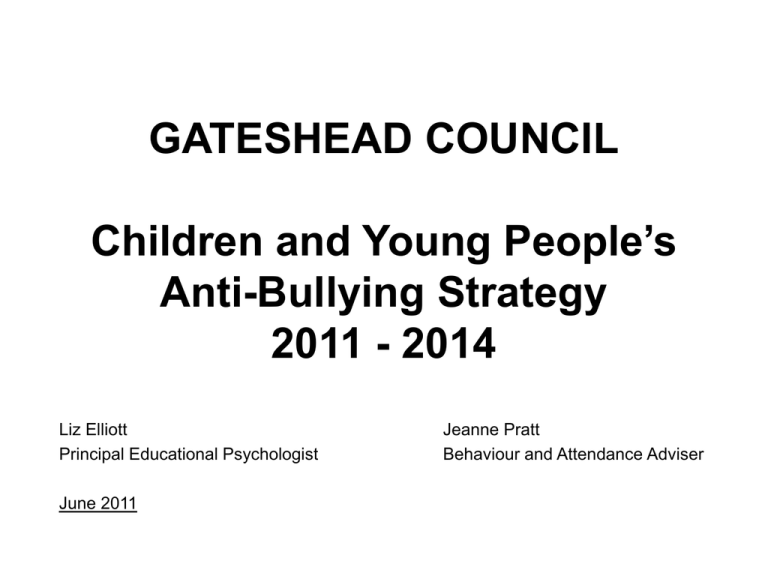
GATESHEAD COUNCIL
Children and Young People’s
Anti-Bullying Strategy
2011 - 2014
Liz Elliott
Principal Educational Psychologist
June 2011
Jeanne Pratt
Behaviour and Attendance Adviser
PURPOSE OF THE STRATEGY
This sets out how Gateshead Council and its
partners will tackle bullying and harassment
involving Gateshead’s children and young
people in educational and community
settings
DEFINITION
Bullying is behaviour, which can be defined as a
repeated attack, physical, psychological, social or
verbal in nature, by those in a position of power, which
is formally or situationally defined, with the intention of
causing distress for their own gain or gratification.
(Besag, 1989)
Bullying is:
Deliberately hurtful behaviour
Often repeated over a period of time
Difficult for those being bullied to defend themselves
Bullying can take many forms, but four main types are:
Physical – hitting, kicking, taking belongings,
destroying belongings
Verbal
– name calling, insulting
Indirect – spreading nasty stories about someone,
excluding someone from social groups
Cyber
– mobile phone calls, text messages, pictures
or video clips, e-mails, chat rooms, instant
messaging, social networking websites
The revised strategy covers the statutory responsibilities of:
Schools – Governing Bodies
– Head Teachers
– Teachers
Children’s Services Authorities
Others – e.g. Police, Health Service
The Equalities Act 2010 protects people from discrimination
on characteristics including:
Disability
Race
Religion or belief
Age
Sex
Sexual orientation
National Context
2009 Tell Us Survey 4:
Bullying was an issue for almost half children and young
people
Local Context
2010 PCT Health Related Behaviour Survey
34% of pupils afraid to go to school because of bullying,
at least sometimes.
35% had been bullied at or near school in the last 12
months.
72% said their school took bullying seriously
Anti-Bullying Strategy Group
Promote feelings of safety and positive emotional health
and wellbeing in children and young people
Correlate data from ARCH hate crime reports, pupil
surveys etc
Monitor trends
Take action to reduce incidents
Promote consistent good practice across all schools,
settings and agencies
Promote and empower children and young people’s
participation in the development of policy and practice
Anti-Bullying Award Criteria
Pupil / staff / community interest group
Annually reviewed anti-bullying policy
Commitment to access support from relevant agencies
Peer support scheme, e.g. playground buddies
Participation in an annual anti-bullying awareness
raising event – co-ordinated with other schools
Regular, written information for parents on incident
reporting and typical responses
Anti-Bullying Award Accreditation Process
Consultation meeting with Local Authority
representatives to agree development plan
Compilation and submission of evidence portfolio
School visit by Local Authority representative
School gains award if criteria met
Life In School Pupil Survey
On-line – access through Gateshead Grid for Learning
Parallel versions for victims, bullies and bystanders
Asks – What? Why? Where? When? Who?
– What did you do?
– Did you tell anybody about it?
– What did they do that was helpful to you?
Data Summary Reports Available: Pie Charts, Bar Charts
etc.
Support available from the ICT Consultants at City
Learning Centre – Trevor Carter, Peter Bolger
Under licence from Vantage Technologies
Licence fee £2,000 p.a.
Renewable mid-February 2012
90 days notice of licence cancellation
Pick a week in October for Gateshead Schools to use the
Life in School survey so the results are available for
November’s Anti-Bullying Week?
CONSULTATION
The draft revised strategy and consultation
questionnaire will be e-mailed to all schools,
community settings and agencies working
with our children and young people

